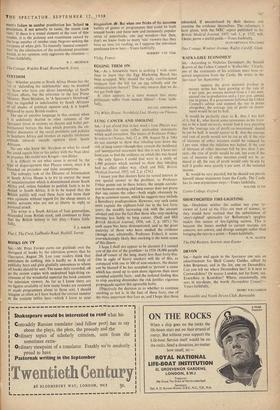LUNG CANCER AND SMOKING
S1R,—I am afraid that in last week's issue Pharos was responsible for some rather misleading statements which need correction. The letters of Professor Fisher he refers to (Nature, July 12. p. 108, August 30, p. 596) do not attempt to show that inhaling cuts down the risk of lung cancer (though they contain the incidental and unsupported statement that this is so), I have not been able to find the evidence on which this was based —the only figures I could find were in a study of 1,400 patients which seemed to show that inhaling had no effect either way. (Doll and Hill, British Medical Journal, 1952, vol. 2, p. 1274.) I assure you that doctors have no vested interest in one special answer to the problem; as Professor Fisher points out in these letters, the simple correla- tion between smoking and lung cancer does not prove that one causes the other—both might obviously be doe to common causes, which he suggests may in'clude a hereditary predisposition. However, any such cause must explain the eighteen-fold rise in the last forty years, the steadily increasing risk with the amount smoked and also the fact that those who stop smoking become less liable to lung cancer. (Doll and Hill British Medic-al Journal, 1956, vol. 2, p. 1071.) No such cause•has -been demonstrated, and to the great majority of those who have studied the evidence (though not, admittedly, Professor Fisher), it seems overwhelmingly likely that smoking is the main cause of this illness.
I hope I shall not appear to be alarmist if I remind you of the size of the problem—in 1956 18,000 people died of cancer of the lung, many less than forty-five. One in eight of heavy smokers will die of this, as compared with one in 300 of non-smokers. No doctor can be blamed if he has accepted as 'proven' a cause which has stood up to tests more rigorous than most accepted scientific facts: and the isolated finding that to stop smoking diminishes the risk justifies vigorous propaganda against this agreeable habit.
Objectively the decision as to whether to continue smoking or not is, in the face of these facts, one of the more important that face us, and I hope that those
interested, if unconvinced by their doctors will examine the evidence themselves. The references I have given, with the MRC report published in the British Medical Journal, 1957, vol. 1, p. 1522, will, I hope, prove a useful guide.—Yours faithfully,
GLYN GREVILLE WILLIAMS


































 Previous page
Previous page